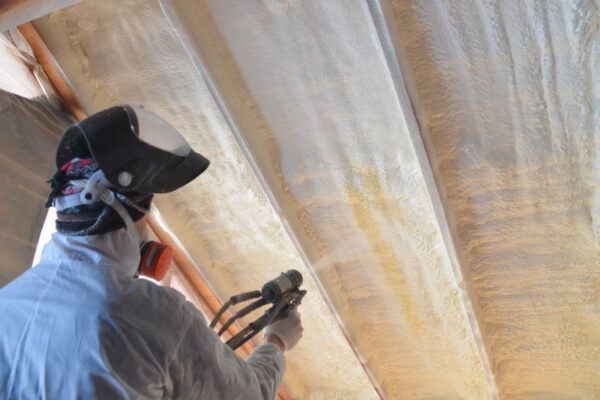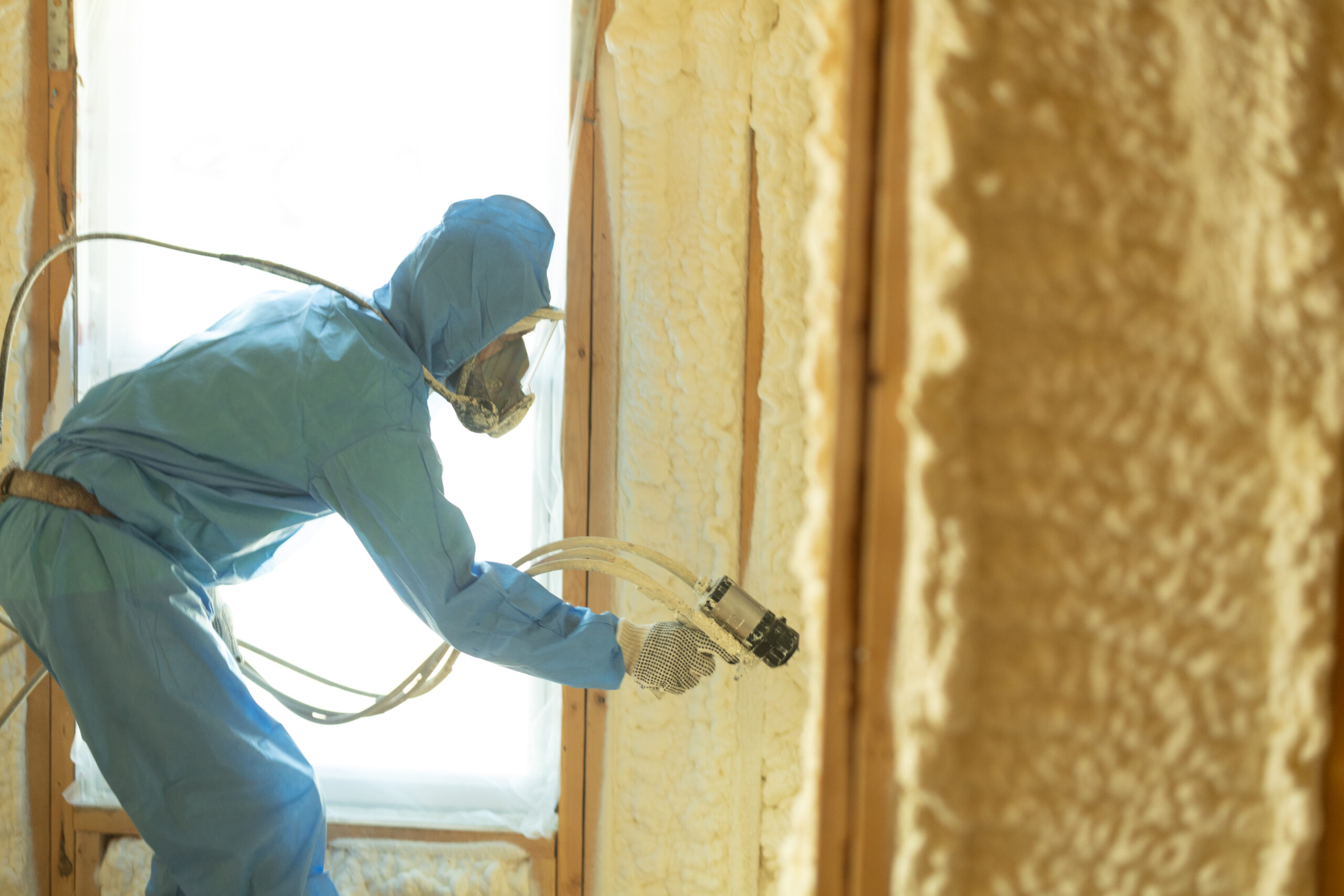Leading Applications of Spray Foam for Residential and Commercial Properties
Leading Applications of Spray Foam for Residential and Commercial Properties
Blog Article
Spray Foam: The Ultimate Remedy for Air Sealing and Insulation
Spray foam insulation has become a leading solution for reliable air sealing and thermal insulation, using an unique combination of homes that establish it in addition to conventional techniques. Its capacity to increase and fill spaces makes it especially reliable in protecting against air leakage, which can substantially influence power efficiency. However, comprehending the complete extent of its advantages, installation processes, and comparisons with other insulation types is vital for making educated decisions. As we explore these aspects, the implications for both new buildings and retrofits end up being significantly substantial. What factors should influence your choice?
What Is Spray Foam?
Spray foam is a flexible insulation material that incorporates the principles of air sealing and thermal resistance to improve energy performance in buildings. Composed largely of polyurethane or other comparable substances, spray foam is applied as a fluid that broadens upon contact with surface areas, producing a strong, constant layer of insulation. This distinct home allows it to load spaces, cracks, and spaces that conventional insulation products may overlook, supplying an exceptional air seal.
There are 2 primary types of spray foam: open-cell and closed-cell. Open-cell spray foam is lighter and extra flexible, offering exceptional sound absorption and a reduced R-value per inch - Spray Foam. On the other hand, closed-cell spray foam is denser, giving a higher R-value, dampness resistance, and added architectural integrity to constructing elements
The application procedure usually involves specific equipment, making sure a smooth application that follows numerous substrates, including timber, concrete, and steel. This adaptability makes spray foam appropriate for both brand-new constructions and retrofitting existing frameworks. Its capacity to produce an airtight barrier dramatically contributes to minimizing power intake and improving interior air quality, consequently making it a preferred selection amongst home owners and home builders alike.
Advantages of Spray Foam Insulation
One of one of the most significant benefits of spray foam insulation is its exceptional capability to create a constant air obstacle, which effectively lessens energy loss. Unlike conventional insulation materials, spray foam broadens to load spaces and cracks, making sure that air leak is drastically minimized. This characteristic not only improves energy efficiency yet likewise leads to reduce energy costs with time.
In addition, spray foam insulation gives remarkable thermal resistance, adding to an extra steady interior atmosphere. Its high R-value per inch enables for effective insulation in confined rooms, making it excellent for attic rooms, wall surfaces, and crawl spaces. Furthermore, the moisture-resistant buildings of spray foam assistance avoid mold and mold development, promoting much healthier living problems.
One more crucial advantage of spray foam insulation is its sound-dampening top qualities (Spray Foam). It efficiently reduces sound transmission between areas, producing a quieter and much more comfy home atmosphere. The longevity of spray foam likewise attracts attention, as it does not droop or work out over time, preserving its efficiency throughout its life expectancy
Just How Spray Foam Works
Recognizing how spray foam insulation functions is important for valuing its effectiveness in air securing and thermal resistance. Spray foam insulation includes two key parts: isocyanate and polyol material. When these components are blended, they undergo a chain reaction that causes the material to increase rapidly, producing a thick foam that fills cracks, tooth cavities, and voids.
As the foam broadens, it follows surface areas, forming a closed seal that dramatically reduces air infiltration. This characteristic makes spray foam insulation extremely reliable at preventing drafts and moisture penetration, which can cause power loss and damages with time. Furthermore, the closed-cell version of spray foam provides exceptional thermal resistance as a result of its inflexible structure, properly decreasing warmth transfer.
The one-of-a-kind residential properties of spray foam permit it to satisfy irregular surfaces, guaranteeing extensive protection and a seamless barrier. Consequently, spray foam insulation not only enhances power efficiency but also contributes to improved interior air top quality by lowering the buildup of contaminants and allergens. Ultimately, recognizing the technicians behind spray foam emphasizes its function as an exceptional choice for insulation and air sealing in both industrial and domestic applications.
Setup Refine Introduction

Prior to installment, the space needs to be adequately cleaned up and prepped, making certain that surfaces are totally free from debris, dirt, and moisture. This action is crucial since pollutants can endanger adhesion and overall performance. As soon as the area is prepared, the application involves mixing both components of the spray look at this now foam, which expands upon get in touch with and fills up gaps efficiently.
Trained experts need to conduct the installation, using customized tools to guarantee uniform protection and ideal this contact form density. Safety and security preventative measures, consisting of using safety equipment and ensuring correct air flow, are essential throughout this process. After application, the foam normally remedies swiftly, developing a solid barrier that boosts power effectiveness.
Comparing Spray Foam to Conventional Insulation
When examining insulation options, spray foam insulation stands out in contrast to conventional materials such as fiberglass and cellulose. Unlike fiberglass and cellulose, which can enable air infiltration, spray foam increases upon application, filling up voids and gaps to create an impermeable seal.
Furthermore, spray foam provides a greater R-value per inch than traditional insulation kinds, providing even more efficient thermal resistance in a thinner account. This characteristic is particularly valuable precede with minimal tooth cavity deepness. Moreover, spray foam is resistant to wetness and mold development, which can be a significant worry about cellulose and fiberglass, particularly in damp settings.
However, spray foam insulation commonly carries a higher ahead of time cost than its standard equivalents. Home owners should consider this first investment against long-lasting power financial savings and efficiency benefits. Eventually, while both insulation kinds offer their objective, spray foam becomes a more sophisticated remedy for modern insulation needs, especially in regards to air securing and thermal efficiency.

Verdict
In summary, spray foam insulation represents an extremely efficient option for achieving optimal air sealing and thermal resistance. Its unique residential properties, consisting of wetness resistance and audio dampening, make it ideal for numerous applications in both brand-new building and constructions and retrofitting tasks (Spray Foam). The preliminary costs might be greater compared to traditional insulation products, the long-lasting advantages, such as considerable energy cost savings and improved interior air high quality, justify the financial investment and underscore its value in modern-day building practices.
Spray foam insulation has actually emerged as a leading remedy for effective air securing and thermal insulation, using a distinct mix of residential properties that set it apart from standard methods.Spray foam is a functional insulation material that incorporates the principles of air securing and thermal resistance to enhance power efficiency in buildings.When evaluating insulation choices, spray foam insulation stands out in contrast to conventional products such as fiberglass and cellulose. Ultimately, while both insulation kinds offer their purpose, spray foam arises as a more sophisticated remedy for modern insulation requirements, particularly in terms of air sealing a fantastic read and thermal performance.
In recap, spray foam insulation represents an extremely reliable service for accomplishing optimum air sealing and thermal resistance.
Report this page